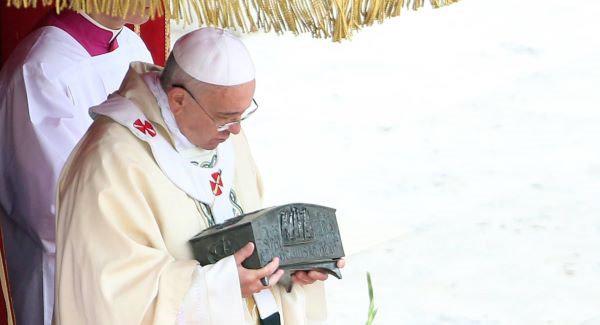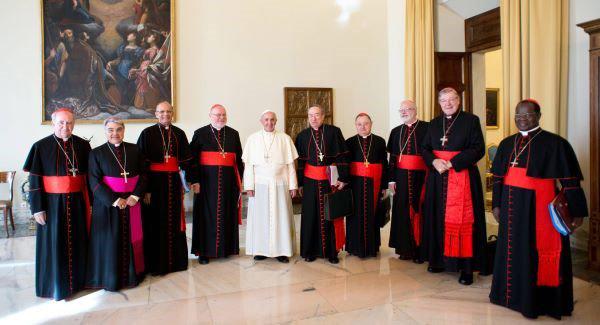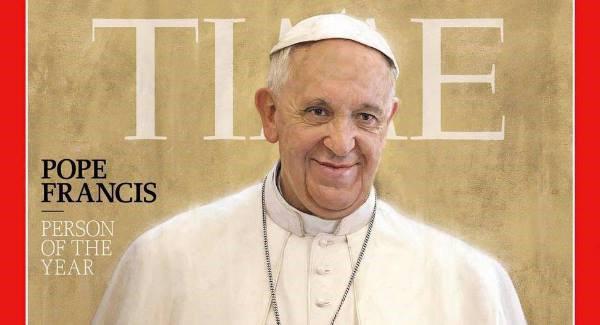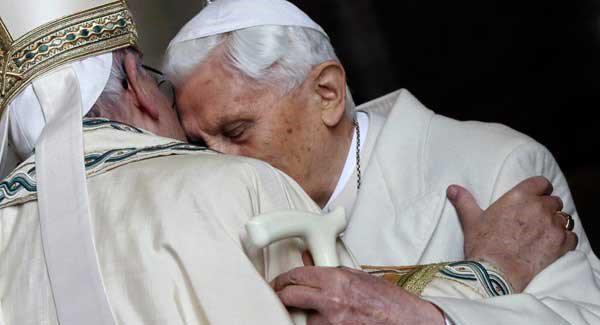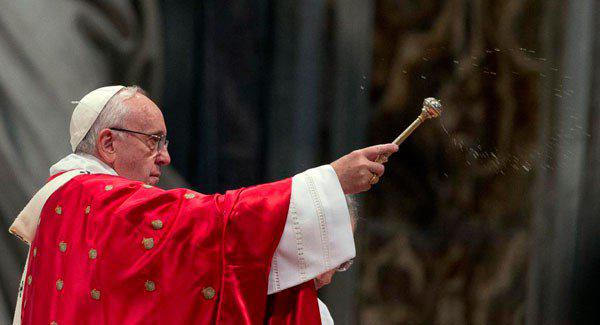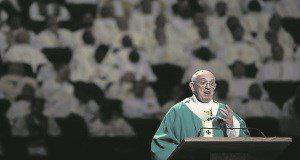|
Legacy of Pope Francis will be inaction, not reform, if he fails to tackle abuse
Irish Examiner
TP O’Mahony warns that a papacy that promised Church reform will remain mired in controversy unless Francis ensures accountability for the mishandling of abuse cases. THE crisis over clerical sex abuse now engulfing the Catholic Church reaches all the way to the threshold of Casa Santa Marta, the Vatican guesthouse where Pope Francis has taken up residence. His own credibility is now very much on the line, and threatens his legacy as a reforming Pope. His inaction has caught up with him, and constantly preaching about “zero tolerance” while failing to put effective structures in place for dealing with bishops and cardinals who have covered up abuse no longer impresses, as he found out in a particularly painful way during his recent Irish visit. During his two days here — a trip described by one Vatican correspondent as the “toughest and most difficult of his pontificate” — he was left in no doubt about the extent of the alienation and feelings of betrayal experienced by many in the Irish Church. He was certainly left in no doubt that he has not done nearly enough to confront the scandal of sex abuse in the Church, here and elsewhere. It will seem now that his recent decision to summon the presidents of every bishops’ conference around the world (about 100) to attend a four-day meeting in the Vatican to address global clerical sex abuse in February 2019 is a new and positive response. But where is the urgency in this, given that these men could be in Rome within 48 hours? Why wait until next February? Nor could Francis go on sticking to the stance he adopted on the flight home to Rome after his two days in Ireland, when he was informed of the exceedingly damaging 11-page letter from Archbishop Carlo Maria Vigano, the former Papal Nuncio (ambassador) to the United States, who served there while the (now deposed) Cardinal Theodore McCarrick was Archbishop of Washington. It also contained a call for the Pope’s resignation. The timing of the release of that letter, and the way the whole thing was orchestrated, has all the hallmarks of a deliberate attempt to discredit Francis and cause maximum embarrassment. That, however, doesn’t mean that the very grave allegations made in it can be simply brushed aside. The Vigano dossier was far too serious for that. An editorial in the international Catholic weekly, The Tablet, went to the nub of the matter: “The broad sweep of his ‘testimony’ is that the government of the Catholic Church has succumbed to a mafia-like conspiracy, organised by a network of homosexual clergy at all levels of seniority. Their assumed purpose is not only to promote themselves and each other to positions of influence, but also to progressively undermine the Church’s traditional teaching on homosexuality”. When confronted with all of this on the plane, the Pope refused to comment directly, instead telling the journalists on board they could look at the allegations (very serious) in the letter and then make up their own minds. He said he would not say a “single word” about the allegations, though he left open the possibility of a comment from the Holy See. That simply wasn’t not good enough, and, even though one of the central allegations has been discredited (the claim that Pope Benedict XVI imposed sanctions on McCarrick which Francis later removed), the Pope’s continuing failure to deal head-on with the other central claim (that he knew for a long time about McCarrick’s sexual improprieties but did nothing) would have cast an ominous shadow over his papacy. That is, for as long as the claim went unrefuted. Now we know that the Vatican will issue a response to the Vigano dossier. It will be an institutional, rather than a personal response. A statement from the Pope’s council of nine cardinals (C9) said it was “aware that in the current debate” the Holy See is about to issue “necessary clarifications”. There will be a lot of interest in that response, whenever it comes. It may well be, as one of the Pope’s biographers, Austen Ivereigh, told BBC Radio 4, that the Vigano letter is part of a “right wing plot” against Francis. This Pope has some very powerful enemies, and it is also the case that no other pope in the modern history of the papacy has come in for such sustained and public criticism as Francis.
In recent weeks there has been much talk of an “ideological culture war” within the Church, between liberals and conservatives, and some scholars have maintained that this “culture war” is “tearing the Church apart”, especially in the United States. According to the Rome correspondent of The Tablet, earlier this year Cardinal Raymond Burke, who was removed from his Vatican post by the Pope and has since become one of his fiercest critics, gave a lecture on the limits of papal authority in a hotel just two miles from the Vatican. Among the audience was Archbishop Carlo Maria Vigano. This is just another aspect of the “culture war”. Two recent books — To Change the Church: Pope Francis and the Future of Catholicism by Ross Douthat, and The Dictator Pope: The Inside Story of the Francis Papacy by Marcantonio Colonna — bear testimony to the vitriol that is fuelling criticism of Francis. People in high places in the Church, in Rome and elsewhere, want him out. Seen in this context, the Vigano dossier can be regarded as part of a plot to force a second papal resignation in our time. Up to recently the observation of Paul Vallely, author of Pope Francis: The Struggle for the Soul of Catholicism, has remained true: “Francis is not winning the hidden civil war being waged inside the Curia between the reformers and those who are consistently blocking important remedial action on paedophile priests and episcopal cover-ups.” It was the frustration caused by this that led to the resignation of Marie Collins from the pontifical sex abuse commission. But it is time now for Francis to get tough, and establishing an independent tribunal with powers of dismissal to deal with bishops and religious superiors who cover up the abuse of children — which Marie Collins has been calling for — would be a real sign that this is now happening. He has said she is “fixated” on the tribunal idea, but it is hard to understand his failure to take the initiative here, not least because he set the scene himself for such a tribunal when he issued an apostolic letter entitled “As a Loving Mother” in June 2016. This contained provisions for the removal of bishops and religious superiors if found to be negligent in the exercise of their office, particularly “in cases of sexual abuse inflicted on minors and vulnerable adults”. There is also now a new focus on the need to involve the laity in any tribunal process. It is no longer good enough to have clerics investigating other clerics. Catherine Pepinster, former editor of The Tablet, told the BBC that the laity must be involved. This view was also expressed in a recent editorial in The New York Times. It said that Francis will need to look beyond the cardinals, prelates, and priests for solutions. “Any credible effort at eradicating the cancer of sexual abuse will require the full participation of experts, prosecutors, victims, and many others — women as well as men. If that runs against tradition and practice, so be it.” This echoes a call by Cardinal Daniel DiNardo, president of the US Conference of Catholic Bishops, for a national lay commission to be granted independent authority to investigate, first of all, the McCarrick scandal. The Pope needs to act on this and not wait until February. Fr Thomas Reese SJ, who has written extensively about the Vatican, says there is only one way the bishops can regain credibility: “That is to give a full and credible account of past abuse. Only when all the information is out will people begin to believe that the Church has got things under control.” In addition to his troubles within the Vatican, where a corrupt old guard are doing all they can to frustrate him, the Pope’s own record on handling sex abuse allegations against priests when he was Archbishop of Buenos Aires is coming under fresh scrutiny. According to Paul Vallely, the Pope’s mis- handling of the Bishop Barros case in Chile earlier this year carries unhappy echoes of his own performance in Buenos Aires. According to Vallely, when Jorge Mario Bergoglio was president of the Argentine Bishops’ Conference, the organisation missed the Vatican’s 2010 deadline to create safeguards against new abuses. Peter Saunders, the other lay person who resigned along with Marie Collins from the papal commission, is highly critical: “Francis is now implicated in covering up sex abuse. He seems to be no different from those other senior clerics who prefer to avoid, to cover up, and to hope it will go away. The Church should be leading the way, and not covering up”. The Pope’s own role in Argentina’s most famous case of priestly sex abuse is back in the spotlight. According to Nicole Winfield of the Reuters bureau in Rome, in 2010, when he was still Cardinal Jorge Mario Bergoglio, Francis commissioned a four-volume, 2,000-plus-page forensic study of the legal case against a convicted priest that concluded he was innocent, that his victims were lying, and that the case should never have gone to trial. “Despite the study, Argentina’s Supreme Court in March 2017 upheld the conviction and 15-year prison sentence against Fr Julio Grassi, a celebrity priest who ran homes for street children across Argentina.” Grassi’s victims have claimed the then-Cardinal Bergoglio backed the accused priest.
In a wider context, a good deal of responsibility for the growth of the culture within which cover-up and evasion of responsibility for clerical sex abuse of minors and seminarians flourished can be laid at the feet of Karol Woltyla, the Polish Pope. During his long pontificate, he was at best indifferent to a spate of reports about dreadful behaviour, reports emanating initially from the US. Two of the early whistleblowers were Fr Tom Doyle, a canon lawyer, and Richard Sipe, an ex-priest. His book, A Secret World: Sexuality and the Search for Celibacy, claimed that 6% of priests (later revised to 9%) had had sexual contact with minors and at least a third of clergy were homosexuals. And thanks to a fine obituary in the Irish Times (Sipe died in August) by their former religious affairs correspondent, John Cooney, we now know that in 2010, Sipe wrote to Pope Benedict informing him that McCarrick’s sexual misconduct “had been widely known for decades”. Nor should we forget that in May 2001, Pope Benedict, then Cardinal Joseph Ratzinger, prefect of the Congregation for the Doctrine of the Faith (CDF), sent two letters to Catholic bishops all over the world. One letter instructed bishops to keep both secret; the other instructed them to send all clerical child abuse allegations “with a semblance of truth” to the Congregation and it would decide whether these be dealt with at diocesan or Vatican level. Those letters would not have been sent without the approval of John Paul II. Future church historians will provide a proper perspective on the effects of the indifference of Pope John Paul II, but will also take due note of the fact that he shielded Fr Marcial Maciel, the Mexican founder of the Order of the Legionaries of Christ, a notorious serial abuser of seminarians. He also fathered four children by different women. In his book The Pope in Winter: The Dark Face of John Paul II’s Papacy, John Cornwell says: “John Paul allowed the case of Maciel to gather dust within the Vatican for years.” It has not gone unnoticed that both Maciel and McCarrick raised enormous amounts of money for the Vatican. “McCarrick had a reputation as an extraordinary fundraiser,” says Christopher Lamb. “In 1988, he had helped set up the Papal Foundation, which has raised many millions from wealthy US catholics to support special projects of the Pope.” We also now know — thanks to a newly-released letter — that the Vatican knew of McCarrick’s predatory behaviour at least from the year 2000. The letter, dated 22 November, 2000, was from Fr Boniface Ramsey, a pastor in New York, complaining of “McCarrick’s relationships with seminarians and the whole business of sleeping with seminarians”. The letter wasn’t accusing seminarians of anything; it was accusing McCarrick”, said Fr Ramsey. A 2006 letter, from a top official in the Vatican Secretariat of State, obtained by the Catholic News Service, acknowledged the allegations regarding McCarrick made in 2000 by the New York priest. Fr Ramsey’s letter was received in 2000 during the pontificate of John Paul II who, a few months later, made McCarrick a cardinal (February 2001). He served as Archbishop of Washington until 2006, under the pontificate of Benedict XVI. And it was also on Karol Wojtyla’s watch that the Archbishop of Boston, Cardinal Bernard Law was moved to Rome, where diplomatic immunity was bestowed on him, before he could and should have been made answerable in a US court. His criminal behaviour over an extended period was exposed by the investigating team of the Boston Globe, and this story was later the basis for the award-winning 2015 film Spotlight, starring Mark Ruffalo, Michael Keaton, and Rachel McAdams. The effects of the culture that, while it may have predated the pontificate of John Paul II, certainly went unchecked by him, were discernible in the 2010 letter to Irish Catholics following the Murphy Report by his successor, Pope Benedict XVI. That letter failed to acknowledge Rome’s culpability for the culture which saw priests, bishops, and popes who, when they learned of abuse, protected each other rather than the victims. Unless Pope Francis ensures there is real accountability for bishops who mishandle abuse cases by means of an independent tribunal that guarantees transparency, his papacy, which promises so much in terms of Church reform, will remain mired in controversy. He has a very different vision of the Church and where he wants it to be from his two immediate predecessors, Benedict XVI and John Paul II, both of whom turned their backs on the reforms of the Second Vatican Council (1962-65). Francis believes in collegiality and wants to move to a synodal Church.
But there is great opposition to this.
|
.
Any original material on these pages is copyright © BishopAccountability.org 2004. Reproduce freely with attribution.
